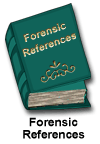|
|
 |
The
required readings for this unit are:
Unit.E.4.2.
Evidence Collection/ Chain of Custody
 Australia
Australia |
Required
Reading(s)
|
 |
Insert article
here
 Canada
Canada |
Required
Reading(s)
|
 |
| McCracken,
L. (1999). Living Forensics: A natural |
evolution
in emergency care. Accident and Emergency Nursing,
7(4), 211-216.
- Note
in this article the ABC's of Forensic Trauma care
|
 International
International |
Required
Reading(s)
|
 |
Insert article
here
 United Kingdom
United Kingdom |
Required
Reading(s)
|
 |
Insert article
here
 United States
United States |
Required
Reading(s)
|
 |
| Hoyt, C.
A. (1999). Evidence recognition and collection |
in the
clinical setting. Critical Care Nursing Quarterly,
22(1), 19-26. Retrieved December 20, 2002, from
EPSCO Database - Academic Search Premier: http://search.epnet.com/direct.asp?an=6822504&db=aph
- Note:
Evidence can be collected that, when used in legal
proceedings, may interrupt the cycle of violence
if a perpetrator is identified and found guilty
by a court of law" (Hoyt, 1999, p. 19).
|
Databases
For the full text article online,
sleuth the 'University
of Calgary/ Library/ Article Indexes':
Directions:
- Select
- Indexes and abstracts with links to full text articles
- Select
- Academic Search Premier or Expanded Academic ASAP
- Select
- Connect
-
Fill in
User ID and Pin
- Fill
in search words:
forensic and evidence collection
forensic
and chain of custody
Top of Page
|
 |
 |
The
'recommended only' readings for this unit are the following:
 Australia
Australia |
Recommended
Reading(s)
|
 |
Insert article/book/chapter here
 Canada
Canada |
Recommended
Reading(s)
|
 |
Insert article/book/chapter here
 International
International |
Recommended
Reading(s)
|
 |
Insert article/book/chapter here
 United Kingdom
United Kingdom |
Recommended
Reading(s)
|
 |
Insert article/book/chapter here
 United States
United States |
Recommended
Reading(s)
|
 |
| Christian,
C. W., Lavelle, J. M., De Jong, A. R., Loiselle, J.; |
Brenner,
L., & Joffe, M., (2000). Forensic evidence
findings in prepubertal victims of sexual assault.
Pediatrics, 106(1), 100-104. Retrieved December
20, 2002, from EPSCO Database -Academic Search Premier:
http://search.epnet.com/direct.asp?an=3338142&db=aph
- Note:
The American Academy of Pediatrics recommends forensic
evidence collection when sexual abuse has occurred
within 72 hours, or when there is bleeding or acute
injury. It is not known whether these recommendations
are appropriate for prepubertal children, because
few data exist regarding the utility of forensic
evidence collection in cases of child sexual assault.
This study describes the epidemiology of forensic
evidence findings in prepubertal victims of sexual
assault
|
| Weigler,
S. (1992). Bite mark evidence: Forensic |
odontology
and the law. Health Matrix: Journal of Law Medicine,
2(2), 303-323. Retrieved December 20, 2002,
from EPSCO Database -Academic Search Premier: http://search.epnet.com/direct.asp?an=9609042710&db=aph
- Focuses
on the science of forensic odontology.
Emphasis on bite mark analysis; History of the admissibility
of bite mark evidence; Definition of forensic
odontology as the application of the science of
dentistry to the field of law; Bite mark comparison
as a controversial aspect in forensic odontology;
Major areas of interest in forensic odontology
|
Top of Page
|

|
Additional
references for this unit can be found in 'forensic
references'
of the forensic sourcebooks.
- Sleuth
'forensic reference' database for:
Top of Page
|

|
Video's
recommended for this unit are:
|
|
Resources
(Video)
|
 |
Insert video
here
Top of Page
|

|
The
required websites to sleuth for this unit are the following:
 Australia
Australia |
Resources
(Web)
|
 |
Insert website here
 Canada
Canada |
Resources
(Web)
|
 |
Insert website here
 International
International |
Resources
(Web)
|
 |
Insert website here
 United Kingdom
United Kingdom |
Resources
(Web)
|
 |
Insert website here
 United States
United States
|
Resources
(Web)
|
 |
Insert article here
Top of Page
|
 |
For
additional websites on this unit, sleuth 'forensic
websites' in the forensic sourcebooks.
Top of Page
|
 |
|